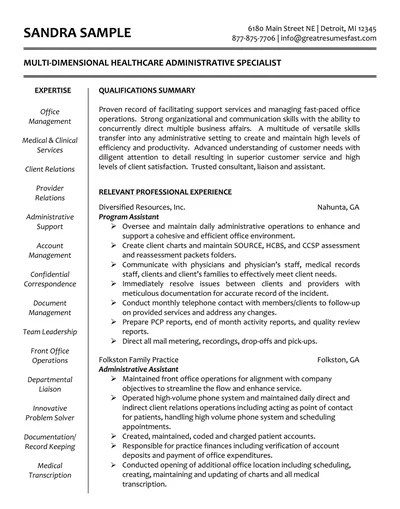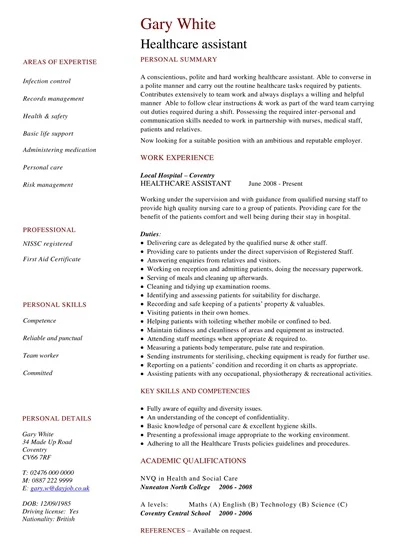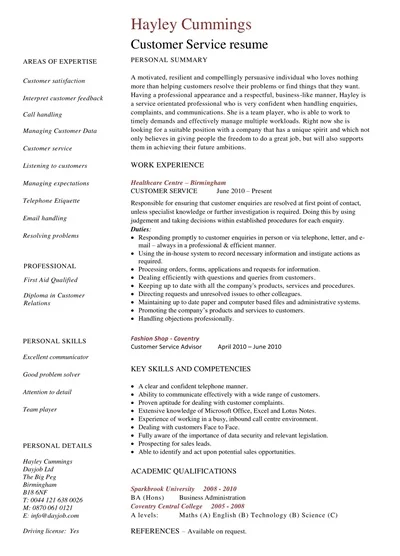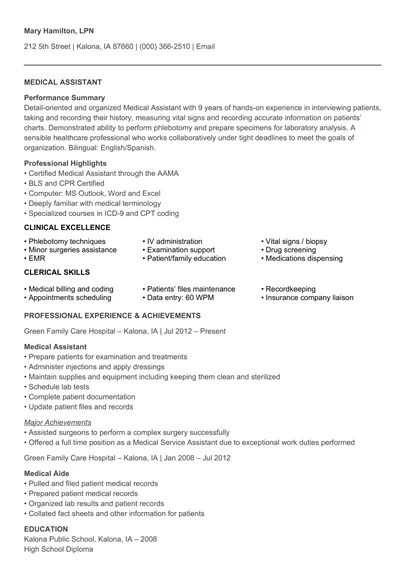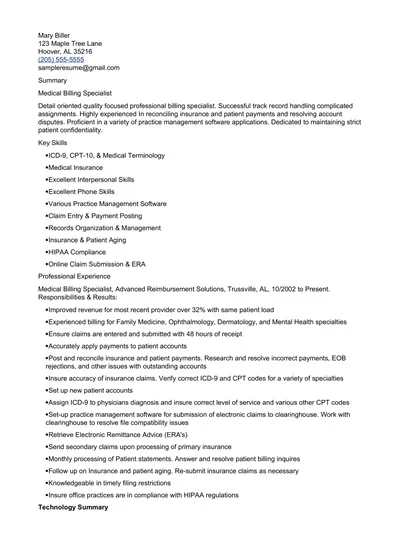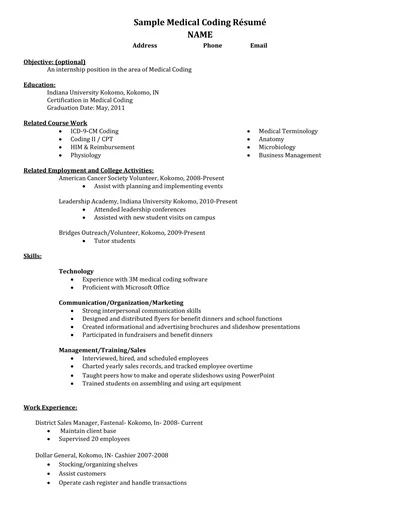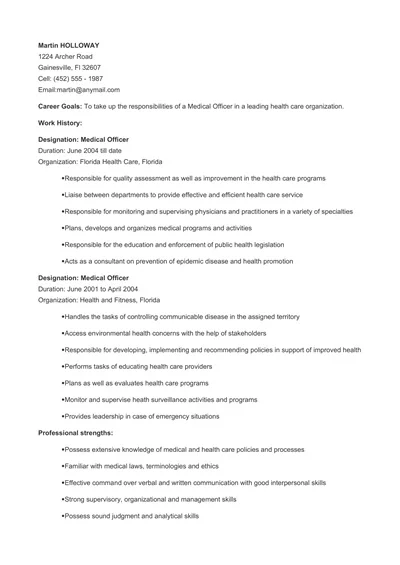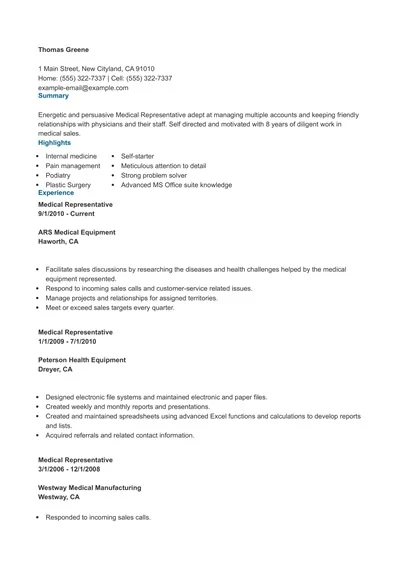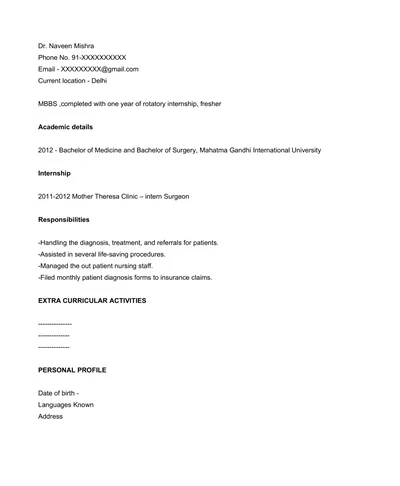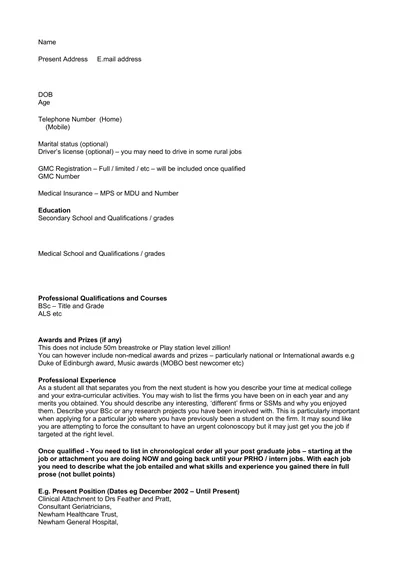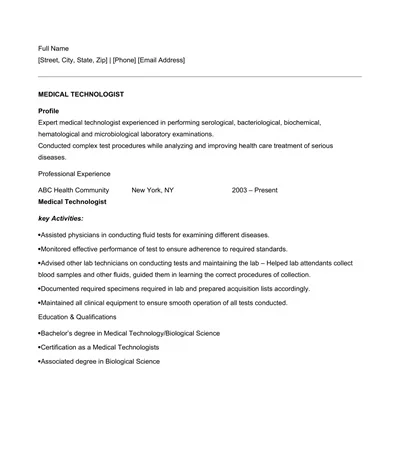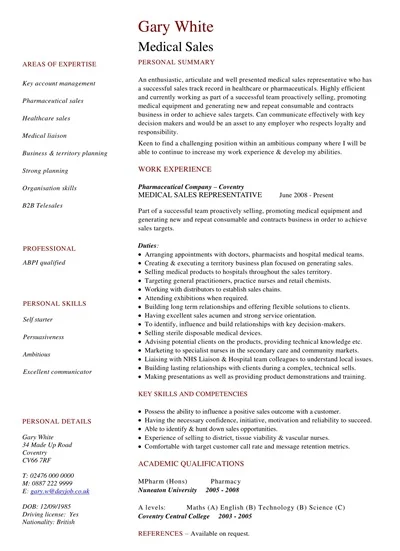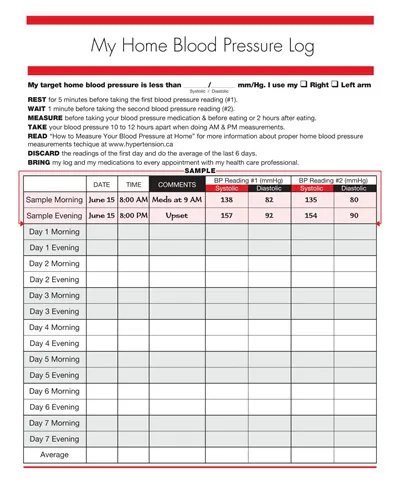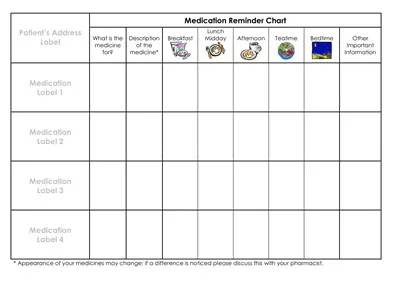A Medical Resume Template is an outline prepared in advance to assist Medical professionals in writing their work history, experience, skills, and accomplishments in a professional, concise, and correct format.
It consists of domains containing specific areas related to the medical industry, such as education, experience in clinical settings, certifications, and licenses. Through this template, the candidates are in a position to present themselves as they desire employers in various hospitals, clinics, and even other healthcare facilities.
Download Free Medical Resume Templates
What is a Medical Resume?
Medical Resumes are a type of curricula vitae document intended for use by healthcare professionals. They present their achievements, work history, and competence to practice in the medical field. They can emphasize their preparation for certain posts, such as a doctor in a hospital or clinic, a medical researcher in a research centre, and other related establishments.
This type of resume must provide a detailed and accurate narration of the candidate’s medical training, professional certifications, licenses, residency training, and clinical clerkship, if any; in addition, it must include other special skills such as patient care qualities, medical technology expertise, and working under stress among others.
The goal is to give a brief but clear idea about the applicant’s professional medical history to the employers and, of course, to justify why he or she is fit for a particular position for which he or she is applying.
Key Components of a Medical Resume
In simple terms, a medical resume is a specialized resume that showcases your background, skills, and experience in the relevant medical profession. Regardless of whether you are applying as a doctor, nurse or health care facility manager, the right resume plays a vital role in distinguishing between ‘yes I did’ and ‘no you did’.
Here are some key components that should be included in a medical resume:
- Contact Information: In the first line, include your complete name with the phone number, email address, and physical address as well. A link may be included, or a professional website may be included.
- Professional Summary: Sometimes referred to as a professional profile, a professional summary is a short section of your resume that describes your experience, skills, and ability to offer employers. Make adjustments based on the particular medical job you are applying for and the company’s needs.
- Education: Enumerate your medical degree(s), then follow up with certificates or certifications if you have any and/or any special training that you have undergone. Specify the name of the institution, course of study, name of degree earned, and years of attendance.
- Clinical Experience: Be concise about your clinical rotations, residence, or any other sectors that offer practical hospital experience. Provide the name of the institution and your position at the organization, and briefly describe your task and accomplishments.
- Professional Experience: Regarding your professional experience in medical facilities other than your clinical practice, if any, please list these positions with some information about your responsibilities and/or achievements in the position.
- Licenses and Certifications: Licenses in the medical field, which may include boards’ licenses as well as other related training certificates, should be shown, including the issuing bodies and validity dates.
- Skills: Point out particular medical competencies or subspecialties, as well as any interpersonal strengths or proficiencies that may be relevant in medical contexts (e.g., communication, leadership skills).
- Professional Affiliations: A record of association with any of the medical societies can be included here.
- Publications and Presentations: If your involvement was in research, highlight the articles or papers that you have authored, the posters that you have perhaps presented or the talks that you may have delivered at various medical forums.
Common Mistakes to Avoid in a Medical Resume
However, certain mistakes are probable when developing a medical resume and can adversely affect your further invitation for an interview. It is important to ensure that your resume does not contain these mistakes, as they will definitely reduce the chances of its success.
1. Inconsistency in Formatting
Check for plain format on your resume. Font choice should stay constant in size and type, and avoid spacing that is too large or too small, and always arrange experiences in a reverse chronological order. Such disparities are cliquish and jarring to the reader, which shifts the emphasis away from your credentials in your resume.
2. Overlooking Keywords
Job descriptions in the ads usually include keywords such as position description and the skills and experience required. Not including the above keywords in your resume can make your application disappear without a trace, as it will not be read by the Applicant Tracking Systems (ATS) or even the hiring managers.
3. Including Irrelevant Information
Finally, it’s always important to know where you’re putting your resume and to leave out experiences or skills that have little relevance to the job being applied for. Filtering out the irrelevant information leads to the potential obscurity of the accurate and acceptable qualifications on the candidate’s resume.
4. Not Quantifying Achievements
Just telling me about your role is insufficient. Whenever possible, use actual specific results and figures stating how you achieved the improvement or solved the problem to prove your efficiency.
5. Lack of End-User Data or Having Typing Errors
Consider reading your resume twice or thrice to remove all the typos before hiring managers catch a glimpse of them; also, ensure that you put your phone number and other contact details correctly. Sitting down, mistakes and omissions may be viewed as negligence in meticulous work, whereas incorrect phone numbers often lead to lost business.
Importance of a Well-Crafted Medical Resume
Medical resumes are essential job-hunting assets for healthcare professionals who seek to market the professional value they bring, as well as their portfolio of relevant experience and specific abilities. Indeed, they serve as a gateway to the employer, and that’s why presenting oneself affirmatively and in the most understandable way is vital.
This document should not only sell the candidate’s academic credentials and field experience but also showcase the candidate’s devotion to patient Advocacy and lifelong learning. As the field of healthcare is rather popular and saturated, the expert has to perform and stand out among numerous competitors. To do this, people need a proper resume that will help them get the desired position in accordance with their abilities and preferences.
Pros and Cons of Creating a Medical Resume
A well-written medical resume can greatly affect your employment in the profession area and has incentives along with demerits.
Pros:
- Showcases your credentials and experience: It is particularly vital to present your education, formal certification, and prior employment experience in a compelling manner in your medical resume so that potential employers can view you as an asset.
- Tailors your application for the position: These are quite important because they help tailor your resume, meaning that the hiring manager is more likely to notice you as a potential candidate due to the fact that some of the skills and experiences that you have listed are the strongest ones that can be of help in the given employment.
- Professional first impression: The resume gives a picture of a well-prepared person, which is vital in the healthcare sector when faced with patience.
Cons:
- Time-consuming to perfect: Writing a good resume and then making sure it properly represents your qualifications is not an easy task and may entail a good deal of time to complete. It should, in particular, be updated and rewritten to fit various positions.
- May not fully convey your capabilities: This is a drawback when it comes to resume requirements because, in the medical field, interpersonal skills, manners, and general conduct cannot be fully expressed on paper.
- Risk of becoming outdated: A resume is particularly important, especially in rapidly changing fields such as healthcare. A new year or new job application may involve a new certification or technique not included in your previous or older resume.
Tips for Writing an Effective Medical Resume
Preparing a medical resume demands detailed and crucial features that would impress the employer and meet his/ her expectations of a candidate.
Below are key tips to consider:
Highlight Your Clinical Skills
Enumerate your specific clinical competencies and the measures for which you possess adequate training. If there are any specific machines or tools that you have used before, you should indicate so, as well as any certification that you may have.
Education and Training
Begin with your most recent degree earned and all education, considering relevant certifications, residencies, and fellowships. These are the particular details of the institutions where you trained or attended, and they must include the respective years you were there.
Professional Experience
In detailing the positions held, it is essential to indicate the title of the position held, the name and location of the healthcare facility where you worked, and the dates you worked there. Under each role, avoid the use of long paragraphs to list your duties instead use bullet point format to outline your responsibilities and ensure that you only explain the major ones, aim at describing your achievements in relation to the patient or the improvements made to the facility.
Licenses and Certifications
Enumerate all licenses, certificates and permits you have been granted in your professional arena plus the issuing bodies and, if any, the expiry date. This could entail state licenses, BLS and ACLS licenses, among other licenses.
Professional Affiliations
Professional associations demonstrate the continuous commitment of a professional to his area of practice. You should also add any roles or contributions you have made to these organisations.
Tailor Your Resume
The next tip is to ensure you write and design your resume to match the job opening you are interested in. Emphasize those sectors of experience and acquirements that total up to the description of the job.
Use Keywords
Most employers today have implemented ATS to scan through resumes as their healthcare facility of work. Keywords are important to filter your resume when passing through these systems, so you should incorporate the keyword used in the job listing.
Proofread
However, do not allow any grammatical and typographical errors to be featured in your resume. It would not be a bad idea to have someone of your pal or a trainer in the healthcare industry read through a resume.
How to Write a Medical Resume Template
Designing an impressive medical resume and curriculum vitae involves proper format and presentation of the actual content that defines the candidate’s and the professional’s experiences and skills in the medical field.
Below is a guide to help you write an effective medical resume template:
- Contact Information:
- Full name
- Address (optional)
- Phone number
- Email address
- LinkedIn profile (optional)
- Professional Summary:
- An objective statement about yourself should take 2-3 lines and estimate your educational/professional background and skills/achievements.
- Education:
- The following is a list of all the education qualifications attained in reverse order according to the year attained.
- The diploma must contain the degree awarded, the name of the institution, and the date of graduation.
- Licenses and Certifications:
- Any medical licensing that may have been done and any certification that may have been issued by relevant competent authorities.
- This is in the form of the certifying body and the date on which the certification was conducted.
- Professional Experience:
- The previous and current occupation, starting with the most recent one, in this particular context.
- If a candidate has held several jobs in the same company, provide the job title, employer, position location, and dates of employment.
- Employ lists with points for relative weight when stating your activities and accomplishments in every position.
- Skills:
- A set list of skills that may include medical expertise and soft comprehension, such as patient care, proficiency in medical technologies, and interpersonal communication.
- Professional Affiliations and Memberships (if applicable):
- The organizations or associations that you belong to or the membership associations or organizations that you have in the practice of your profession.
- Publications and Presentations (if applicable):
- What kind of publications, research, papers, or presentations have you done?
- Volunteer Work (if applicable):
- Any volunteer work that would be pertinent, particularly if the worker has prior experience in a medical capacity.
Recheck your resume for any mistakes and ensure that its language is plain and to the point, with no possibility of typing errors. To improve one’s chances, one can consider making the process of resume writing more elaborate by customizing the resume based on the job applied for.

